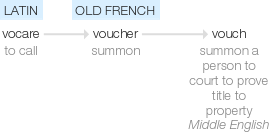Vouch
Middle English (as a legal term in the sense ‘summon a person to court to prove title to property’): from Old French voucher ‘summon’, based on Latin vocare ‘to call’.
wiktionary
The verb is derived from Middle English vouchen(“to call, summon; to provide; to make available, proffer; to affirm, declare formally”)[and other forms], [1] from Anglo-Norman vocher, voucher, woucher, and Old French vocher, voucher, vochier(“to call, summon; to claim; to call upon, invoke; to denounce”)[and other forms], from Latin vocāre, [2] the present active infinitive of vocō(“to call, summon; to call upon, invoke; to designate, name; to bring or put (into a condition or state)”), ultimately from Proto-Indo-European *wekʷ-(“to sound out; to speak”).
Verb sense 6.1 (“to summon (someone) into court to establish a warranty of title to land”) in the form vouch to warrant or vouch to warranty is a calque of Anglo-Norman and Old French voucher a garant. [2]
The noun is derived from the verb. [3]
etymonline
vouch (v.)
early 14c., "summon into court to prove a title," from Anglo-French voucher, Old French vocher "to call, summon, invoke, claim," probably from Gallo-Roman *voticare, metathesis of Latin vocitare "to call to, summon insistently," frequentative of Latin vocare "to call, call upon, summon," which is related to vox (genitive vocis) "voice" (from PIE root *wekw- "to speak"). Meaning "guarantee to be true or accurate" is first attested 1590s. Related: Vouched; vouching.
